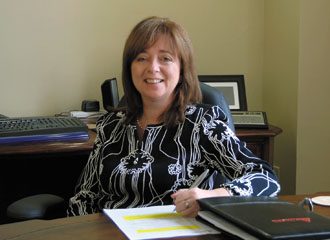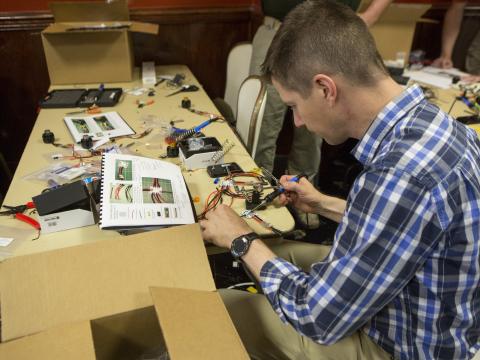Small Business Targets Cybersecurity for IT Growth
Lisa N. Wolford is the founder, president and chief executive officer of
Federal contract rules offer attractive terms for growing company. 
CSSS.NET.
Lisa N. Wolford grew up loving water sports. A former competitive swimmer, she worked as a lifeguard as a teenager and young adult. Later she took up motor boating, kayaking and sailing as well as jet and water skiing. But probably because she came of age in land-locked
That proved no hindrance later in life. As a federal information technology executive, the former U.S. Marine Corps radio operator figured out how to catch a big wave and ride it to success.
Almost from the first day she founded CSSS.NET in 1997, Wolford knew she wanted to become a federal contractor. But starting the company out of her home so she could also look after her small children, one of whom is disabled, Wolford initially built her business around commercial customers.
Today, her company relies on federal contracts for 100 percent of its revenues. About 65 percent of those are defense-related, with the Air Force as the company’s largest client. Civilian agencies account for the rest of the company’s sales.
As such, Wolford is part of a major trend of businesses targeting federal agencies for improved sales. She beat the big boys to the punch: several major technology leaders have bought their way into the federal arena in the last 18 months—and Wolford knows why.
“The federal world does have a lot of rules and regulations,” acknowledges Wolford, who divides her time between
“But I will say the federal marketplace has rules of the road about how competitions are to be handled. You can call those rules of fair play. Otherwise, they are known as the FAR [Federal Acquisition Regulation]. And here’s the thing—the stability that comes with federal contracts allows you to make commitments to your employees in the form of benefits that the commercial structure does not allow you to do,” she emphasizes.
Entering the federal arena in 2001, Wolford knew the market would be huge and expanding. In fact, the federal government spends as much as $80 billion a year on information technology infrastructure and services. By law, contractors must perform most of the work.
Throw in the billions of dollars for federal health information technology and cybersecurity in the Obama administration’s $787 billion stimulus plan and it is a very lucrative market indeed. That is why so many major corporations recently have acquired federal information technology contractors.
In September 2009, Xerox agreed to buy Affiliated Computer Services for $6.4 billion. That same month, PC maker Dell agreed to acquire Perot Systems for about $3.9 billion. Hewlett-Packard agreed to acquire EDS in May 2008 for $13.9 billion, making the computer giant the twelfth largest federal prime contractor.
Of course, Wolford’s company is nowhere in that league. However, CSSS.NET itself is a fast-growing company with several competitive advantages. The firm brings in about $15 million in revenues annually, and Wolford expects to double sales roughly every three years.
While that may seem to be an overly optimistic forecast, CSSS.NET has several competitive advantages. The company is a federal Small Business Administration certified 8(a) small disadvantaged business. It also is a woman-owned business. And, CSSS.NET is a certified service-disabled veteran-owned small company.
Wolford says she became disabled in the Marines from carrying field radio packs that hurt her back. Her federal designations mean that, for certain programs, some agencies can award her contracts without the need for formal competitive bidding.
“Those are door openers,” she says. “Those are checkboxes as I call them. But you have to able to perform. I want people to do business with me because of the caliber of the firm.
“So, my past performance and our history demonstrate our ability to perform on mission-critical systems. That’s both from a national defense perspective and within the civilian agency world.”
Though she cannot break down revenue with percentages, Wolford says cybersecurity is becoming an important growth driver for CSSS.NET. It is easy to see why—all anyone has to do these days is pick up a newspaper to read about the increased threat to the nation’s information grid. In December 2009 alone, two major information technology breaches rocked the country. On December 17 the massively popular Internet messaging site Twitter succumbed to a cyber attack that routed users to an anti-American message purportedly from a group referring to itself as the “Iranian Cyber Army.” That same day, news broke that Iraqi militants had used a $26 piece of software sold over the Internet to hack into
“A lot of our warfare in the future is going to be electronic,” Wolford says. “Our enemies are going to try to take us down either through our Defense Department systems or through other systems—our financial systems, for example. Or, they could disrupt power grids and power supplies.
“One of the services we provide is information assurance, which is what is typically called cybersecurity. We do both tactical and policy work for the Defense Department. We’ve been doing that for some years now as well as computer network attack and defense.
“And, we are prime contractor to the IRS for cybersecurity. We have been doing that for a year now. We took that work away from some large businesses. We have been successful. The IRS has given us a subsequent contract award. We have done well in their arena,” she says.
Wolford’s involvement with information technology began before her government days. She joined the Marine Corps during the recession of 1981 after graduating from a local technical institute for computer programming. After attaining the rank of corporal, she left the service on what she says was a hardship discharge before her initial four-year stint was completed.
That is because her second child, her son Forrest, had several disabilities that required constant care. Despite that disadvantage, Wolford attended college as a single parent. In 1992, she graduated magna cum laude from the
Wolford has received several awards over the years. In 2009, she was named Woman of the Year in Engineering Services in IT by the National Organization for Professional Women. She also won the Mentor-Protégé Nunn-Perry Award from the Defense Department.
As she looks back on her career today, Wolford says she finds it hard to believe that she started her own company when her daughter Natalie was 10 and her son Forrest was 13. In particular, Forrest required a lot of parental help because he has cerebral palsy. Wolford says doctors gave her an extremely negative prognosis for Forrest, saying he would never walk, talk or even become toilet trained.
Today at 26, Forrest, who is 5 feet tall and weighs 140 pounds, can work out on a treadmill for 20 minutes and also lifts weights at a local gym. In addition to physical therapy, he performs aqua therapy and goes horseback riding.
“I think many of the barriers we experience in life are self-imposed by our own views of what we are or are not capable of,” Wolford says. “So, I have never allowed the word ‘can’t’ to be used with my son.
“A lot of people did not think it was a great idea for him to go to the gym. But I think it’s a great idea. It’s a healthy environment where people are taking care of their bodies. I just don’t believe in placing limits on my son. I don’t believe there is any limit to what he can achieve any more than there is for anyone else.”
WEB RESOURCE
CSSS.NET: www.csss.net


